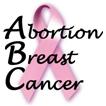Cover-up discussed at doctor's meeting
Abortion-Breast Cancer Cover-up to be Discussed at Association of American Physicians and Surgeons 60th Meeting
The Coalition on Abortion/Breast Cancer announced today that its president, Karen Malec, will speak about the government's cover-up of the abortion-breast cancer (ABC) link at the 60th Meeting of the Association of American Physicians and Surgeons (AAPS) on September 19, 2003. Her speech, "Perversion of Science by Politics: Case Study-Informed Consent," will take place at 11:00 a.m. at Marriott's Grand Resort in Point Clear, Alabama.
Mrs. Malec's article for the AAPS was published in the summer issue of the Journal of American Physicians and Surgeons and entitled, "The Abortion-Breast Cancer Link: How Politics Trumped Science and Informed Consent." 1
The AAPS' motto, "omnia pro aegroto," means "all for the patient." The group advocates for patients' rights.
"The National Cancer Institute (NCI) and the rest of the cancer establishment are making themselves irrelevant by covering up the ABC link," said Mrs. Malec. "They're stepping up their use of junk science for the purpose of manipulating public opinion and are severely damaging their credibility in the process. They're selectively reporting flawed studies, which misclassify thousands of post-abortive women as non-abortive. They're using a hypothetical problem, 'report bias,' to disparage more than two dozen studies linking abortion with breast cancer.
"We call on the cancer establishment to show the same regard for patients' rights as does the AAPS," said Mrs. Malec.
Serious charges of impropriety were made against the cancer establishment in a recent Los Angeles Times commentary. Drs. Samuel S. Epstein, professor emeritus at the University of Illinois at Chicago School of Public Health, and Quentin D. Young, chairman of the Health and Medicine Policy Research Group, accused the cancer establishment of suppressing evidence of environmental and occupational links to cancer, as well. For instance, it wasn't until 1997 that the NCI informed the public about long-standing evidence of thyroid cancers from radioactive fallout resulting from atomic bomb tests in the 1950's. These cancers could have been prevented with thyroid medication. 2
"The NCI is a corrupt agency," said Mrs. Malec. "It wasn't until 1957 that it warned the public about the tobacco-cancer link. Even then, its warning was tepid because its political considerations are paramount."
Epstein and Young charged that the American Cancer Society (ACS) accepts contributions from manufacturers of polluting chemicals and cancer drugs. They declared that the Society's "strong support from industry is reflected in its research choices, which are overwhelmingly aimed at treatment (as opposed to prevention).
"As the Chronicle of Philanthropy, the nation's leading charity watchdog, put it in a January 1992 article," said Epstein and Young, "'The ACS is more interested in accumulating wealth than saving lives.'" 3
Known as "the world's wealthiest charity," the ACS pays a six-figure salary to each of its officers who head a division.
Cancer deaths jumped 30 percentage points and the NCI's budget ballooned from $150 million to $4.6 billion since Nixon's "War on Cancer" began in 1971. "Paradoxically, it seems that the more we spend on cancer research, the more cancer we get," remarked Epstein and Young.
"There is sufficient evidence," argued Mrs. Malec, "that cancer has become a business. The evidence extends back to the 1960's when the American Medical Association and several top cancer research hospitals accepted grants from Big Tobacco. 4
"The NCI's snow job on the ABC link is criminal," Mrs. Malec maintained. "The cancer industry should be investigated."
The Coalition on Abortion/Breast Cancer is an international women's organization founded to protect the health and save the lives of women by educating and providing information on abortion as a risk factor for breast cancer.
- 1. Malec, K. Journal of American Physicians and Surgeons. Summer 2003, Vol. 8, No. 2; pp. 41-45.
- 2. Drs. Samuel Epstein and Quentin Young, "An Ounce of Prevention." Los Angeles Times (August 31, 2003) p. M1.
- 3. Hall H., Williams G. "Professor vs. Cancer Society," p. 26, January 28, 1992.
- 4. According to the former head of the Food and Drug Administration, David Kessler, the tobacco industry gave grants to researchers at Harvard, UCLA, Sloan-Kettering Institute for Cancer Research, and others. He added that, "In 1964 the AMA was vigorously lobbying against pending Medicare legislation while the tobacco industry was fighting efforts to place health warnings on cigarette packs. At the same time, the six major companies offered the AMA $10 million over a five-year period to fund research on smoking and health. On February 12, 1964, Francis Blasingame, the AMA's executive vice president, accepted the industry's offer. A little more than two weeks later, Blasingame sent a letter to the Federal Trade Commission, a strong advocate of warning labels. 'With respect to cigarettes,' he wrote, 'cautionary labeling cannot be anticipated to serve the public interest with any particular degree of success.'" [Kessler, D. A Question of Intent: A Great American Battle with a Deadly Industry. Public Affairs. New York, 2001; p. 207]



